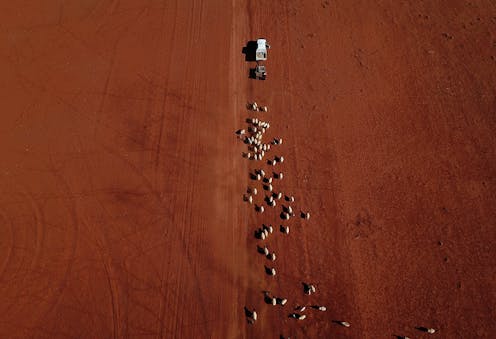Australia is to have a poet laureate – how will the first appointment define us as a nation?
- Written by Valentina Gosetti, Associate Professor in French and Australian Research Council DECRA Fellow, University of New England

Poetry has often been a matter of nation building, including in Australia. Who hasn’t learnt by heart at school some verses from My Country[1] (1908) by Dorothea Mackellar?
I love a sunburnt country,A land of sweeping plainsOf ragged mountain ranges,Of droughts and flooding rains.I love her far horizons,I love her jewel-sea,Her beauty and her terror –The wide brown land for me!
I discovered this poem when I first visited Canberra, many years before becoming an Australian citizen, when I saw its words sculpted on a hill next to the National Arboretum. There it was: all the emotional strength of local attachment against the deep blue sky of the Australian capital city.
At the launch of Revive, Australia’s new cultural policy, Prime Minister Anthony Albanese announced “the establishment of a poet laureate for Australia”. The statement was welcomed by the audience with cheer and applause. Sarah Holland-Batt read a poem about her late father, called The Gift. “Wonderful to have poetry, books and stories as a central part of the #NationalCulturalPolicy launch,” tweeted the Australian Publisher’s Association.
The enduring links between the arts and national identity could not have been stronger. The prime minister said it is “through the arts that we build our identity as a nation and as a people”.
A new literary funding body, Writers Australia, will oversee the selection of the poet laureate. But some questions remain. Will Australia make a brave choice? And even before this, what is a poet laureate in the first place?
Read more: Anthems, 'ranthems', and otherwise loves: nationalism in Australian poetry[2]
On April 8, 1341, poet Francesco Petrarca from the Tuscan town of Arezzo, more widely known as Petrarch (1304–1374), attended an official ceremony that was inspired by revived classical traditions dating back at least 12 centuries. On Rome’s Capitoline Hill, the Campidoglio, a crown of laurels was placed upon his head as an eternal consecration of his poetry.
Since then, Petrarch has been known as il poeta laureato, the poet laureate. Portraits of Petrarch depict him wearing this crown of laurel leaves, the evergreen tree that has symbolised victory since Ancient Greece.
The tradition of the poet laureate has continued through the centuries, all around the world, where the election of a poet laureate has become a national matter.
In the United Kingdom, the position was recognised as a royal office in 1668, when John Dryden (1631–1700) became England’s first official poet laureate. The honorary 10-year appointment, currently held by Simon Armitage, still comes from the monarch, on the advice of the prime minister.
The United States Poet Laureate, a title that dates back to 1937, is appointed by the Librarian of Congress, who is, in turn, appointed by the president. The current laureate is Ada Limón, appointed in 2022, the 24th official laureate and first Latina poet to occupy the position, the present title having been sanctioned by an act of Congress in 1985. The position has previously been held by the likes of Joy Harjo, Rita Dove, Elizabeth Bishop, Robert Lowell, Philip Levine, Mark Strand, Joseph Brodsky and Louise Glück.
Historian Anne-Marie Thiesse has noted that in France “writers are given the power to make – or break – the national consciousness”. In Ireland, upon the death of Nobel Laureate Seamus Heaney (1939–2013), Enda Kenny, the then Taoiseach of the Republic of Ireland, professed that the poet had been “keeper of our language, our codes, our essence as a people”.
Read more: Ada Limón is a poet laureate for the 21st century, exploring 'what it looks like to have America in the room'[3]
But nationalistic conceptions of literature create other issues. The poet laureate embodies the voice of an entire nation. The poet can thus become a highly political and politicised figure. Historically, the formation of national literatures has meant many voices have been excluded.
As Thiesse notes, until very recently “feminine originality has seldom been grounds for recognition as a writer of national significance”. The first woman to be appointed poet laureate of the UK was Carol Ann Duffy only in 2009; she was also the first openly gay writer in this role.
The same goes for poets writing in minority languages, writers from diverse backgrounds, First Nations writers, or whoever questions or challenges the status quo. The current poet laureate of New Zealand, Chris Tse[4], for example, has sought to address the question of how to negotiate matters of identity alongside the responsibilities of his official position.
Australia’s new arts policy, which includes a commitment to the full adoption of the Uluru Statement from the Heart, takes as its fundamental pillar the principle of “First Nations First” – a recognition of the fact the arts and stories of the oldest continuing living culture in the world are the foundation of who we are as a people and a country.
With the appointment of its very first poet laureate, Australia has an unmissable opportunity. We can only hope that, in keeping with the spirit of Revive, the decision will reflect its call for diversity and honour this foundational pillar.
New Zealand’s poet laureate Chris Tse.References
- ^ My Country (www.dorotheamackellar.com.au)
- ^ Anthems, 'ranthems', and otherwise loves: nationalism in Australian poetry (theconversation.com)
- ^ Ada Limón is a poet laureate for the 21st century, exploring 'what it looks like to have America in the room' (theconversation.com)
- ^ Chris Tse (www.theguardian.com)

















